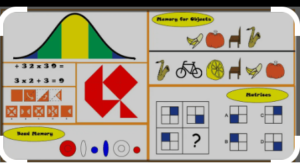What is An intelligence test
Intelligence tests are the means of measuring people’s neuropsychological functions, including verbal, mathematical, and non-verbal aptitude, perception, learning, executive functions, and language comprehension and production.
These abilities are crucial for many facets of daily life, from making decisions to performing well in school and at work. To assess their cognitive functioning, those who struggle (or excel) in one or more of these areas may choose to have intelligence testing done, or have someone else do it for them. The outcomes of this examination could guide therapeutic strategies (like cognitive rehabilitation) or educational programming (like specialized curriculum) for severe cognitive issues. Tests of intelligence may also be helpful in tracking any alterations in cognitive capacities throughout time.
Intelligence tests in psychology
Intelligence tests in psychology measure a person’s cognitive abilities, such as their ability to reason, solve problems, and remember things. Intelligence tests are used for a variety of purposes, including: Qualifying individuals for educational programs, Identifying special education needs, and Diagnosing developmental abnormalities or learning disabilities.
In psychology, intelligence tests are structured assessments designed to measure an individual’s cognitive abilities and intellectual potential. These tests evaluate various mental faculties such as reasoning, problem-solving, memory, understanding, and verbal or non-verbal abilities. They aim to provide a quantitative measure of intelligence, often expressed as an Intelligence Quotient (IQ) score.
Intelligent testing:
The idea and practice of evaluating people’s performance on a variety of diagnostic tools (intelligence tests) in order to forecast their future behavior and prospects in life, or to suggest treatments (such as educational programs), is known as intelligence testing.
From:
Encyclopedia of Applied Ethics (Second Edition), 2012
Examples of intelligence test
Here are some common examples of intelligent tests:
1. Stanford-Binet Intelligence Scales
- Measures: General intelligence, verbal and non-verbal reasoning, memory, and problem-solving.
- Age Range: 2 years to adulthood.
- Example: Identifying patterns or completing verbal analogies.

2. Wechsler Intelligence Scales
- Includes:
- Wechsler Adult Intelligence Scale (WAIS): For adults.
- Wechsler Intelligence Scale for Children (WISC): For children aged 6-16.
- Wechsler Preschool and Primary Scale of Intelligence (WPPSI): For younger children (ages 2.5–7).
- Measures: Verbal comprehension, working memory, processing speed, and reasoning skills.
3. Cattell Culture Fair Intelligence Test
- Focuses on: Minimizing cultural and language biases by using non-verbal questions.
- Measures: Fluid intelligence through pattern recognition and problem-solving tasks.
4. Woodcock-Johnson Tests of Cognitive Abilities
- Measures: Broad cognitive abilities like memory, processing speed, and reasoning.
- Common in educational settings to identify learning disabilities or giftedness.
5. Kaufman Assessment Battery for Children (KABC)
- Focus: Designed for children aged 3-18.
- Measures: Sequential processing, simultaneous processing, learning, and problem-solving.
- .
6. IQ Tests Available Online (Examples)
- Mensa IQ Test: Designed for individuals seeking to join Mensa, the high IQ society.
- Wonderlic Personnel Test: Used in employment settings to assess problem-solving skills quickly.
Scoring of Tests
The test is scored in terms of intelligence quotient, or IQ. To calculate the IQ (Intelligence Quotient) of a person, psychologists use standardized tests and scoring systems. One common method involves the formula:
IQ = (Mental Age ÷ Chronological Age) × 100
However, modern IQ tests like the Wechsler scales use a statistical norm, where the average IQ is 100 with a standard deviation of 15.
Few Practice Examples of Intelligence questions | Iq level questions
Here are some examples of IQ level questions, categorized by the type of cognitive ability they assess:
1. Logical Reasoning
Question:
If all cats are animals and some animals are dogs, which of the following is true?
a) Some dogs are cats.
b) All animals are cats.
c) Some animals are cats.
d) All dogs are animals.
Answer: c) Some animals are cats.
2. Pattern Recognition
Question:
Find the missing shape in the sequence:
⬤ → ◯ → ⬤ → ◯ → ?
Answer: ⬤
3. Mathematical Reasoning
Question:
What is the next number in the sequence: 2, 6, 12, 20, 30, __?
Answer: 42 (Each number increases by consecutive even numbers: +4, +6, +8, +10, etc.)
4. Verbal Analogies
Question:
Tree is to Forest as Star is to:
a) Sky
b) Universe
c) Constellation
d) Galaxy
Answer: c) Constellation
5. Spatial Reasoning
Question:
Which of these shapes will form a cube when folded?
(Provide options with unfolded cube nets).
Answer: The net with six squares arranged in a cross pattern.
6. Sequence and Ordering
Question:
Rearrange the letters to form a meaningful word: RTEWA
Answer: WATER
7. General Knowledge Logic
Question:
If two hours ago, it was as many minutes past 6 o’clock as there are hours in a day, what time is it now?
Answer: 9:00 (Two hours ago, it was 7:24, which is 24 minutes past 6.)
8. Word Association
Question:
Find the odd one out:
a) Dog
b) Lion
c) Cat
d) Snake
Answer: d) Snake (The others are mammals.)
These questions test reasoning, verbal fluency, mathematical thinking, and spatial ability.